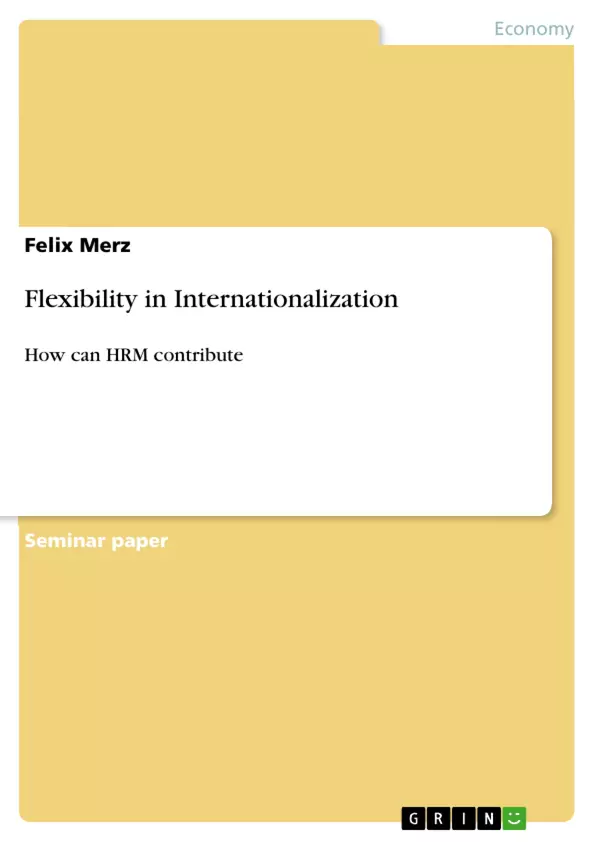Firms going global aim to broaden their range of sales, production or sourcing. Lee and Makhija (2009) confirmed that international investments (export-related investments and foreign-direct investments) could provide flexibility. What the authors didn´t expound on is how Human Resource Management could contribute. The goal of this paper is to show some possibilities concerning qualitative (e.g. broaden the range of employees skills and competencies), quantitative (e.g. use non-standard contract arrangements) and strategic (e.g. linkage of Human Resource Management and top-management concerning strategy development and implementation) contributions of Human Resource Management.
Inhaltsverzeichnis (Table of Contents)
- Abstract
- Table of Abbreviations
- Introduction
- Problem definition
- Layout of this paper
- Flexibility in Internationalization
- Theoretical foundation
- Operational flexibility
- International investments
- Human Resource Management
- Contributions to flexibility by HRM
- Qualitative dimension
- Quantitative dimension
- Strategic dimension
- Conclusion
- Results
- Consequences
- References
Zielsetzung und Themenschwerpunkte (Objectives and Key Themes)
The paper examines the role of Human Resource Management (HRM) in promoting flexibility within internationalization strategies of firms. It aims to explore how HRM can contribute to qualitative, quantitative, and strategic aspects of flexibility in a globalized business environment. The research emphasizes the contributions that HRM can make to enhance adaptability and responsiveness within international operations.
- The significance of flexibility in internationalization
- Contributions of HRM to enhance operational flexibility
- Qualitative, quantitative, and strategic dimensions of HRM's influence
- The role of HRM in supporting international investment strategies
- The relationship between HRM and top management in achieving strategic flexibility
Zusammenfassung der Kapitel (Chapter Summaries)
- Introduction: This chapter presents the problem definition, focusing on the importance of flexibility in internationalization and the need to explore HRM's contributions. It outlines the structure and scope of the paper.
- Flexibility in Internationalization: This section provides a theoretical foundation for understanding flexibility in internationalization. It delves into concepts of operational flexibility, international investments, and the role of HRM within these contexts.
- Contributions to Flexibility by HRM: This chapter examines how HRM can contribute to flexibility through various dimensions. It explores qualitative contributions such as enhancing employee skills and competencies, quantitative contributions like utilizing non-standard contract arrangements, and strategic contributions involving alignment between HRM and top management for strategy development and implementation.
Schlüsselwörter (Keywords)
This paper focuses on the key concepts of flexibility, internationalization, Human Resource Management (HRM), international investments, strategic HRM, operational flexibility, qualitative and quantitative dimensions of HRM, and the relationship between HRM and top management in achieving strategic goals.
Frequently Asked Questions
How does Human Resource Management (HRM) contribute to a firm's international flexibility?
HRM contributes through qualitative (skills), quantitative (flexible contracts), and strategic (alignment with top management) dimensions.
What is the difference between qualitative and quantitative flexibility in HRM?
Qualitative flexibility focuses on broadening employee skills, while quantitative flexibility involves using non-standard contract arrangements to adjust staff numbers.
Why is strategic flexibility important for firms going global?
It allows firms to adapt their strategy and workforce quickly to changing international markets and competitive pressures.
Can international investments provide flexibility?
Yes, export-related and foreign-direct investments can act as a hedge and provide options to shift production or sales across borders.
What role does top management play in HRM flexibility?
Top management must link HRM practices with corporate strategy development to ensure that the workforce is ready for international expansion.
- Citar trabajo
- Dipl.-Betriebswirt (FH) Felix Merz (Autor), 2011, Flexibility in Internationalization, Múnich, GRIN Verlag, https://www.grin.com/document/167547



